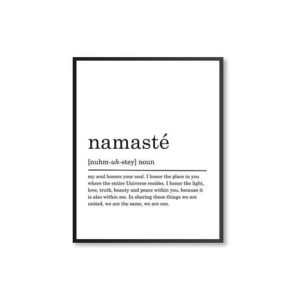
Namaste /ˈnäməˌstā/ in Hindu means “I bow to the divine in you”.
If you subscribe to the idea that we are all spiritual beings having a human experience, this gesture of acknowledgement takes on even greater significance.
Dr. Brene Brown gave the sermon at the Washington National Cathedral on January 21. She talks about the origin of genocide, and how it begins with language. Language that manages to ‘dehumanize’ a group of people. Grouping and bucketing them into a category leads to thinking of people as things. When people become things, horrible things can be done.
There is a similar concept in the best corporate training course I’ve ever taken, which is supported by two books and real results Leadership and Self-Deception and The Anatomy of Peace. The Arbinger Institute has crafted two fictional stories around the concepts of seeing people as people (rather than objects).
The premise is that this subtle but important shift is at the heart of solving conflict…all conflict. As written on the back cover of one of their books, “The Arbinger Institute helps organizations, families, individuals, and communities worldwide to correct the trouble crated by the little-known but pervasive problem of self-deception.”
What is self-deception you might ask?
It begins the moment you hear yourself justify your actions — in that justification, we begin telling ourselves a story that puts another person, inevitably, in a position of wronging us on purpose. Great summary of the book is here.
The Arbinger concept is that we get ‘in a box’. Typically, we find our way to one of four box types:
- ‘Better Than’
- ‘Worse Than’
- ‘I Deserve’
- ‘Must Be Seen As’
I find I can get in the box about something almost daily. Yet, to illustrate what being in the box means, I’ll use an example from the homefront about five years ago — right before I was introduced to these concepts.
I was working full time and my husband was parenting full time. When I’d come home from work and find dirty dishes in the sink, I’d go to the ‘I Deserve’ box.
I’d ruminate so hard and so long about the fact that I deserved to come home from a long day at the office and not have to put dishes in the dishwasher. I told myself horrible things like ‘if he cared about and appreciated me, these dishes would not be waiting’.
In an instant, I turned his busy day when he couldn’t get to the dishes into a reason to find division at the deepest level in our marriage. And, in my mind…it all made sense. It was completely justified. And, suddenly, rather than a person who had had a busy day, he became a force/an object making my life harder. (I know…it’s not pretty. It’s difficult to admit this to all of you).
That’s the danger with self-deception. It spirals out of control and becomes third-degree poison to our relationships so quickly. Sometimes, before we are even aware it’s there.
If you hear a small voice in your head tell you anything that elevates you or devalues you in comparison to another, starts with ‘I deserve…’ or causes you to feel that you must falsely represent yourself in order to gain approval…you are in the danger zone.
Instead, look a person straight in the eye, and say aloud or to yourself, “Namaste. The spirit in me sees the spirit in you.”
It’s the antidote and the way to acknowledging the human, and even the soul, in each of us.
